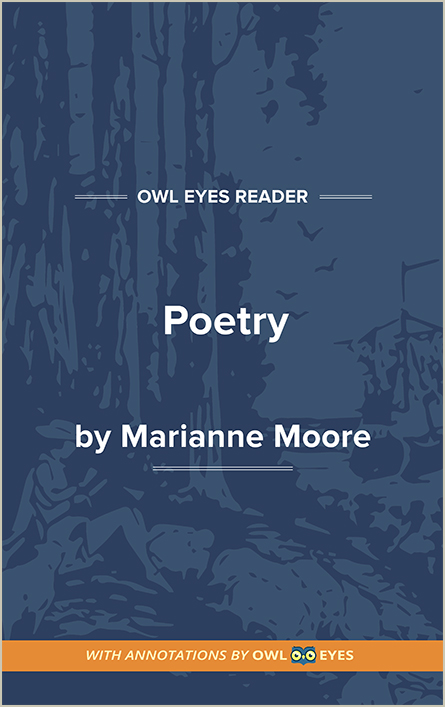- Annotated Full Text
- Literary Period: Modernism
- Publication Date: 1919
- Flesch-Kincaid Level: 19
- Approx. Reading Time: 1 minute
Poetry
Marianne Moore’s “Poetry” is an investigation into the mysterious art of poetry. At times ironic and serious, Moore considers the opposing methods by which poets convey the world: intellection and imagination. Moore explores the ways poetry appeals to our conscious thoughts and our unconscious feelings. On the one hand, poetry is of the intellect; its interests are in “high-sounding interpretation” and a cold understanding of the world. On the other hand, poetry is “genuine”: language that stirs us by evoking the world instead of guiding us to an understanding of it. Moore’s speaker prefers poetry of the latter sort, and the image of “imaginary gardens with real toads in them” defines this type of poetry. In the poem’s final lines, Moore calls for a focus on both the raw material of poetry—language itself—and “that which is… genuine”—those evocations of the world which language, at its most precise, may render. Even the immovable critic in his reach for interpretation finds himself “twinkling his skin” with poetic delight. Finally, the poem’s form expresses its subject quite subtly with Moore employing her usual style of syllabic verse with lines of varying length. The tone is prosaic, with intricate, pivoting sentences that move across line stops and stanza breaks. In an ironic manner, Moore’s form mimics the intellectually-oriented poetry she criticizes. However, to bolster her championing of “the genuine,” the poem also contains a litany of rich, evocative images. Moore makes us feel, fulfilling her vision of poetry’s purpose.
- Annotated Full Text
- Literary Period: Modernism
- Publication Date: 1919
- Flesch-Kincaid Level: 19
- Approx. Reading Time: 1 minute

